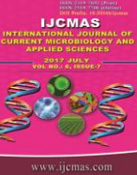


 National Academy of Agricultural Sciences (NAAS)
National Academy of Agricultural Sciences (NAAS)

|
PRINT ISSN : 2319-7692
Online ISSN : 2319-7706 Issues : 12 per year Publisher : Excellent Publishers Email : editorijcmas@gmail.com / submit@ijcmas.com Editor-in-chief: Dr.M.Prakash Index Copernicus ICV 2018: 95.39 NAAS RATING 2020: 5.38 |
Integrated nutrient management system (INMS) gained importance not only in increased yield of crops but also in maintaining the soil health and fertility. Keeping these in views a field experiment was conducted at Mountain research centre for field crops Khudwani (SKUAST-Kashmir) during 2013 (in progress since march 2008) to study the Effect of INM on soil carbon pools and soil quality in rice-brown sarson cropping system with different treatment combinations. Significant build-up in soil fertility in terms of alkaline KMnO4-N, Olsen-P, NH4OAc-K and CaCl2-S as well as SOC pools namely, total organic carbon (TOC), Walkley and Black organic carbon (WBC), labile organic carbon (LBC) and microbial biomass carbon (MBC) were maintained under FYM and integrated nutrient management involving FYM and NPK than unfertilized control plot in 0-15 and 15-30 cm soil depths. Results showed that application of NPK+ FYM significantly increased soil organic matter and available water holding capacity but decreased the soil bulk density, creating a good soil condition for enhanced growth. Microbial population (bacteria, fungi and actinomycetes) were very responsive to organic manure application. The long-term application of organic manures in rice-brown sarson cropping system increased the index value because it increased the nutrient index, microbial index and crop index of soils. The use of only chemical fertilizers in the rice–brown sarson cropping system resulted in poor soil microbial index and crop index. The sustainability index values were 1.00 (the highest for this system) and 0.72, respectively. These results conclude that for sustainable crop production and maintaining soil quality, input of organic manure like FYM is of major importance and should be advocated in the nutrient management of intensive cropping system for improving soil fertility and biological properties of soils.
 |
 |
 |
 |
 |